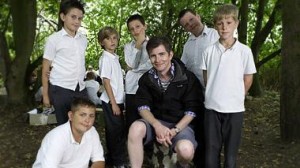Last week I watched the first episode of Gareth Malone’s Extraordinary School for Boys, first broadcast last September in the UK. I really enjoyed Malone’s choir programs; he clearly has a talent for music and community as well as for communicating the process to a television audience. I was curious to see how this transferred to primary schooling reading.

Malone engaged with the boys in his class at Pear Tree Mead Primary School in Essex, sussed out their attitudes and motivations, applied his process skills and adapted lessons to engage the boys in reading –especially those who were most disengaged. Unsurprisingly, he was the diligent, performer- teacher.
I found myself increasingly frustrated as the episode progressed. Would we, I wondered, tolerate Malone making a television program of a quick-fix of a hospital casualty ward, or improving results in an orthopaedic unit? What does it say about our society’s attitude to education that we are not only entertained by a celebrity choirmaster trying his hand at improving literacy for a group of boys, but, to judge by the follow-up comments on the BBC website, convinced UK schooling might be improved by Malone clones.
If we had a hospital or clinic that failed to adequately treat significant proportions of its patients we would expect both the health professionals working there and government health authorities to monitor and fix the service in line with national and international standards – in other words, change what they are doing. There would be complaints and publicity.
Responses from teachers on the BBC website largely follow the line that ‘excessive admin(/paperwork/accountability)’, ‘strict curriculum’ ‘limited funding(/too-big classes/no money for cover to allow teacher out of other lessons)’ and requirements to ‘link to some sort of learning objective or outcome’ prevent the use of ‘creative approaches’ such as Malone’s.
I looked in vain for a professional voice asking how children got through 6 years of primary schooling without the school linking their reading program to their home, diagnosing their strengths and difficulties and changing a regime that clearly hasn’t worked.
I am willing to believe the UK government has excessive paperwork demands. What I can’t believe is that a profession accepts that as sufficient reason for schools failing.
Alan Bevan asked, several months ago, in relation to the McKinsey Report, Would successful school systems have marketing messages for parents and children as well as messages for potential teacher recruits?
All of us know schools that invest time and energy building a community that is well-informed about how kids learn and what it takes to maximise that learning; where fathers and mothers, aunts and uncles, doctors and nurses, businesses and clubs, understand where local teaching programs are heading and what can be done to support and expedite those; where teachers articulate what they know, and are doing – in the classroom, in meetings, by phone, by text, in newsletters – continuously talking to kids, to families, to each other and to the community.
There is a lot of the ‘aorta’ in teachers’ responses to Extraordinary School for Boys on the BBC website – ‘they’ -the government, local authority, Gareth Malone, the BBC- ought to do something. Whether we work for the government, an authority, an independent school, a university or ourselves, this is a professional – or unprofessional – cop-out.
We have enough knowledge and experience to develop a learning program to engage and progress each individual child in his or her environment. We know what parents, families, neighbourhoods and communities can do to give that child the smoothest path and the best chance. We know that every month counts for kids’ learning. Parents do not necessarily know what we know. Good schools convey these messages in all they do and say.
We could do with a bit of help from governments and authorities. “Public health” means the health of the public. We need “public education” to mean the education of the public. Maybe we could convince the Australian Government to develop a public education campaign to inform the community of simple ways to support schools in educating kids so we have an educated community. Routinely reading to kids (or just reading), questions to ask teachers, working with your local school, well-designed schools, school-ready kids, kid-ready schools – there are endless topics for short messages and whole TV programs that would engage the community, support schools and improve the chances of individual children.
We’ve allowed an educational media vacuum to form. It is up to the profession to ensure that vacuum is filled in ways that educate the public and support schools to educate every kid. We could start in Australia.